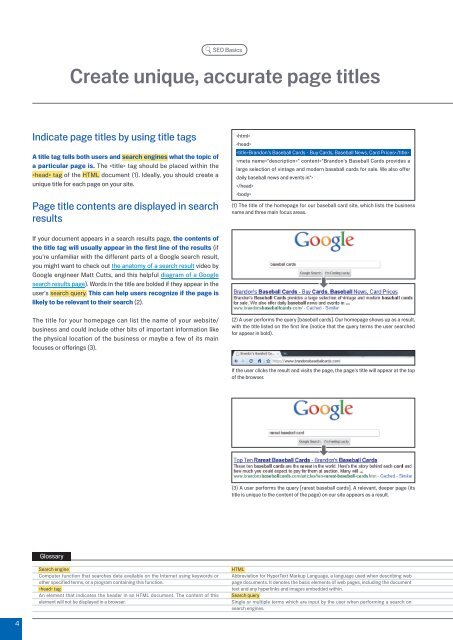Google search engine optimization starter guide
Google search engine optimization starter guide
Google search engine optimization starter guide
Create successful ePaper yourself
Turn your PDF publications into a flip-book with our unique Google optimized e-Paper software.
4<br />
Glossary<br />
SEO Basics<br />
Create unique, accurate page titles<br />
Indicate page titles by using title tags<br />
A title tag tells both users and <strong>search</strong> <strong>engine</strong>s what the topic of<br />
a particular page is. The tag should be placed within the<br />
tag of the HTML document (1). Ideally, you should create a<br />
unique title for each page on your site.<br />
Page title contents are displayed in <strong>search</strong><br />
results<br />
If your document appears in a <strong>search</strong> results page, the contents of<br />
the title tag will usually appear in the first line of the results (if<br />
you're unfamiliar with the different parts of a <strong>Google</strong> <strong>search</strong> result,<br />
you might want to check out the anatomy of a <strong>search</strong> result video by<br />
<strong>Google</strong> <strong>engine</strong>er Matt Cutts, and this helpful diagram of a <strong>Google</strong><br />
<strong>search</strong> results page). Words in the title are bolded if they appear in the<br />
user's <strong>search</strong> query. This can help users recognize if the page is<br />
likely to be relevant to their <strong>search</strong> ( ).<br />
The title for your homepage can list the name of your website/<br />
business and could include other bits of important information like<br />
the physical location of the business or maybe a few of its main<br />
focuses or offerings ( ).<br />
Search <strong>engine</strong><br />
Computer function that <strong>search</strong>es data available on the Internet using keywords or<br />
other specified terms, or a program containing this function.<br />
tag<br />
An element that indicates the header in an HTML document. The content of this<br />
element will not be displayed in a browser.<br />
<br />
<br />
Brandon's Baseball Cards - Buy Cards, Baseball News, Card Prices<br />
<br />
<br />
<br />
(1) The title of the homepage for our baseball card site, which lists the business<br />
name and three main focus areas.<br />
( ) A user performs the query [baseball cards]. Our homepage shows up as a result,<br />
with the title listed on the first line (notice that the query terms the user <strong>search</strong>ed<br />
for appear in bold).<br />
If the user clicks the result and visits the page, the page's title will appear at the top<br />
of the browser.<br />
( ) A user performs the query [rarest baseball cards]. A relevant, deeper page (its<br />
title is unique to the content of the page) on our site appears as a result.<br />
HTML<br />
Abbreviation for HyperText Markup Language, a language used when describing web<br />
page documents. It denotes the basic elements of web pages, including the document<br />
text and any hyperlinks and images embedded within.<br />
Search query<br />
Single or multiple terms which are input by the user when performing a <strong>search</strong> on<br />
<strong>search</strong> <strong>engine</strong>s.

















